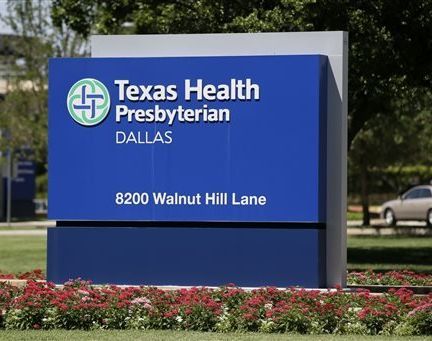
Texas school children have come into contact with the first patient to be diagnosed with Ebola on US soil, Governor Rick Perry has said.
At a news conference at Texas Health Presbyterian Hospital in Dallas, Gov. Rick Perry said the children were being monitored “at home” for symptoms.
The patient is thought to have contracted the virus in Liberia before coming to the US nearly two weeks ago.
He is in a serious condition, a spokeswoman for the hospital said.
“Today we learned that some school-age children had been identified as having had contact with the patient and are now being monitored at home for any signs of the disease,” Rick Perry said.
“Parents are extremely concerned about that development. These children have been identified and they are being monitored.”
Rick Perry emphasized the disease could not be transmitted before a patient showed signs of the disease, and he said Texas had the medical infrastructure to prevent an outbreak.
“The public should have every confidence that the highly trained professional will succeed in this very important mission,” he said.

Meanwhile, in Liberia a government spokesman said the country had put in place “stringent screening” at the airport, where the man showed no symptoms or fever as he departed the country.
“What this incident demonstrates is the clear international dimension of this Ebola crisis,” Lewis Brown, Liberia’s information minister, said in a statement.
“For months, the Liberian government has been stressing that this disease is not simply a Liberian or West African problem.”
More than 3,000 people have already died of Ebola in West Africa and small number of US aid workers have recovered after being flown to the US.
The US Centers for Disease Control and Prevention (CDC) says the Ebola virus seems to have been contained in Senegal and Nigeria, with no new cases reported there for almost a month.
CDC Director Thomas Frieden confirmed the Ebola case on September 30, saying the unnamed patient left Liberia on September 19 and arrived in the US the next day to visit relatives, without displaying any symptoms of the virus.
Symptoms became apparent in the patient on September 24, and on September 28 he was admitted to a Texas hospital and put in isolation.
The unnamed patient was described as critically ill on September 30, suggesting the hospital has upgraded his condition.
Health officials are working to identify all people who came into contact with the unnamed patient while he was infectious, including relatives and a “couple” community members.
Those people will then be monitored for 21 days to see if an Ebola-related fever develops.
However, they will not be monitoring passengers on the man’s flight, where Dr. Thomas Frieden said there was “zero risk of transmission” as the man had been checked for fever before boarding.
According to Thomas Frieden, it is possible a family member who came in direct contact with the patient may develop Ebola in the coming weeks.
On October 1, Zachary Thompson, the director of Dallas County Health and Human Services, told local broadcaster WFAA “there may be another case that is a close associate with this particular patient”.
In an interview with CNN, Dr. Anthony Fauci, director of the National Institute of Allergy and Infectious Disease, suggested the hospital which initially saw the patient should have asked about international travel.
“If the ER physician had asked for a travel history, [and said], <<Do you have any recent travel outside of the country?>> And if the person said, <<Well, I just came back from Liberia>>, that would have been an enormous red flag for anybody, given the publicity that we have,” Dr. Anthony Fauci told the broadcaster.
[youtube cb3DAwNEfB4 650]